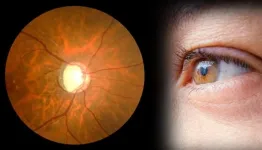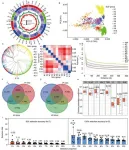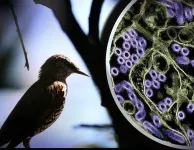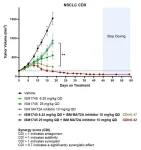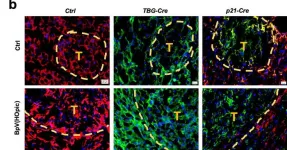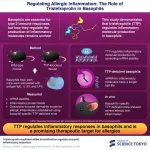(Press-News.org) HOUSTON ― Cardiovascular disease (CVD) and cancer are the two leading causes of death in the U.S. According to researchers from The University of Texas MD Anderson Cancer Center, patients diagnosed with late-stage or metastatic breast cancer have a statistically significant increased risk of pre-diagnosis CVD compared to those with early-stage cancer at diagnosis.
The study, published today in JAMA Network Open, found those with advanced breast cancer at diagnosis were 10% more likely to have had pre-existing CVD. Additionally, the data revealed patients with a specific breast cancer subtype, hormone receptor-positive (HR+) and HER2-negative (HER2-), were most likely to have pre-existing CVD (11%).
“Cardiovascular disease can induce an immunosuppressive state, potentially fostering accelerated breast tumor cell growth and spread,” said senior author Kevin Nead, M.D., assistant professor of Epidemiology and Radiation Oncology. “Our findings suggest that women with cardiovascular disease may be more likely to be diagnosed with advanced breast cancer, highlighting a potential connection between the two.”
The case-control study looked at data from more than 19,000 individuals with a median age of 73 and compared the presence of CVD between patients with early (stage I-II) and advanced cancer (stage III-IV). The increased risk was present both for patients with locally advanced and metastatic breast cancer.
According to the National Cancer Institute, HR+/HER2− breast cancer constitutes nearly 70% of all breast cancer cases. When caught at an early stage, before it metastasizes, the disease is very treatable. However, the five-year relative survival rate for metastatic HR+/ HER2- breast cancer is only 34%, underscoring the need for prevention and early detection.
Cardiovascular disease is the cause of nearly one million deaths in the U.S. annually. This class of conditions can include coronary heart disease, stroke, high blood pressure, heart failure, hypertension and arterial disease.
Of those individuals included in the study, 49% were found to have CVD. The cohort was pulled from the Surveillance, Epidemiology, and End Results (SEER)-Medicare linked databases from 2009-2020. The analysis was completed from May 2023 to August 2024.
“The study could help inform personalized screening strategies, as it suggests that individuals with CVD may benefit from earlier or more frequent breast cancer screenings to catch the disease at an earlier, more treatable stage," Nead said.
Limitations of the study include the fact that it was observational and does not demonstrate causality, susceptibility to residual bias, potential for misclassification of CVD, and lack of control for potential compounding factors, including smoking. The cohort was primarily white, which may also impact the generalizability of the findings.
This research was supported by the National Institutes of Health (CCSG P30 CA016672), the Cancer Prevention and Research Institute of Texas (CPRIT) (RR190077), and the National Cancer Institute (L30CA253796 and K08CA263313). A full list of collaborating authors and their disclosures can be found here.
Read this press release in the MD Anderson Newsroom.
END
Patients with heart disease may be at increased risk for advanced breast cancer
Study finds individuals with advanced or metastatic breast cancer at diagnosis are more likely to have pre-existing cardiovascular disease, versus those with early-stage cancer.
2025-01-02
ELSE PRESS RELEASES FROM THIS DATE:
Chinese Medical Journal study reveals potential use of artificial intelligence (AI) in finding new glaucoma drugs
2025-01-02
Glaucoma is a progressive eye disorder characterized by fluid buildup inside the eye, causing ocular hypertension. By 2040, it is estimated that 111.8 million people worldwide will be affected by glaucoma, potentially leading to blindness if left untreated. Currently, there are treatments available to manage ocular hypertension, but a cure for glaucoma remains elusive.
Retinal ganglion cells (RGCs) are crucial for transmitting visual signals from the eyes to the brain, and their degeneration leads to optic nerve damage, which is a hallmark of glaucoma. In recent years, scientists ...
Genomic analysis of modern maize inbred lines reveals diversity and selective breeding effects
2025-01-02
Maize is a globally cultivated staple crop and one of the most successful examples of heterosis utilization in food production. The development of elite inbred lines is critical for breeding hybrid varieties and achieving sustained yield improvements. However, efficient breeding of inbred lines faces significant challenges, including the broad origins of germplasm resources, complex and diverse genetic structures, and low accuracy in phenotypic prediction. Advances in modern genomics and artificial intelligence technologies ...
Research alert: Enzyme promoting tumor growth and spread in pancreatic cancer identified
2025-01-02
Pancreatic cancer kills 50,000 people each year, according to the National Cancer Institute, and there are few effective treatment options for the disease. In a new study, researchers at University of California San Diego School of Medicine have discovered that an enzyme called MICAL2 promotes tumor growth and spread in pancreatic ductal adenocarcinomas (PDAC), the most common form of pancreatic cancer. The study will be published on January 2, 2025 in Cancer Research, a journal of the American Association for Cancer Research.
Normally, MICAL2 plays an important role in cell migration and morphology. But when the researchers measured ...
NIH officials assess threat of H5N1
2025-01-02
WHAT:
Highly pathogenic H5N1 avian influenza A virus (HPAI H5N1) remains a low risk to the general public, and public health experts in the United States believe that available treatments and vaccines, as well as those in development, are sufficient to prevent severe disease. However, the National Institutes of Health (NIH) and its federal partners remain focused on monitoring the virus and evaluating changes, according to leading officials at the National Institute of Allergy and Infectious Diseases (NIAID), part of the NIH.
In a commentary published in the New England Journal of Medicine, NIAID Director Jeanne M. Marrazzo, M.D., M.P.H., and Michael G. Ison, M.D., M.S., chief ...
Study finds physical activity reduces chronic disease risk
2025-01-02
University of Iowa researchers are recommending all patients be surveyed about their physical activity levels, after a new study underscores the link between physical activity and chronic disease.
The study, led by Lucas Carr, associate professor in the Department of Health and Human Physiology, examined responses from more than 7,000 patients at University of Iowa Health Care Medical Center who noted their level of physical activity in a questionnaire.
From patients’ answers to the questionnaire, the researchers found that those who reported the highest level of physical activity — meaning they exercised moderately ...
Based on AI-powered De novo Generation, Insilico Medicine nominates ISM1745 as preclinical candidate targeting PRMT5
2025-01-02
Since 2021, Insilico Medicine has successfully nominated 22 preclinical candidates (PCCs) with the help of its proprietary Pharma.AI platform, among which 5 were nominated just the year of 2024.
The novel scaffold of ISM1745 is based on de novo generation results of Insilico’s Chemistry42, the generative AI platform combining more than 40 generative models.
With in vivo anti-tumor activity validated in multiple cancer models, the candidate compound showed robust in vivo efficacy as monotherapy as well as combination potential with chemotherapies, targeted agents including MAT2A inhibitor, and immunotherapies.
CAMBRIDGE, ...
A “ticking time bomb” for liver cancer
2025-01-02
Scientists at University of California San Diego School of Medicine have shed new light on the development of liver cancer, the sixth most frequently diagnosed cancer and fourth leading cause of cancer deaths worldwide. The study, published in Nature, reveals a complex interplay between cellular metabolism and DNA damage that drives the progression of fatty liver disease to cancer. The findings suggest new paths forward for preventing and treating liver cancer and have significant implications on our understanding of cancer’s origin and the effects of diet on our DNA.
The incidence of the most common form of liver cancer, hepatocellular carcinoma (HCC), has grown by 25-30% in the past ...
Targeting tristetraprolin in basophils: A breakthrough in allergic inflammation treatment
2025-01-02
Inflammation is a crucial part of the body’s defense mechanism, playing a key role in fighting infections and repairing tissue damage. Basophils, a type of immune cell that makes up less than 1% of white blood cells, have recently emerged as critical players in triggering allergic responses by releasing pro-inflammatory cytokines like IL-4. Despite the established role of basophils in inflammation, the molecular mechanisms controlling their cytokine production have remained unclear.
To address this gap, a group of researchers from Institute of Science Tokyo, led by Professor Kensuke Miyake, conducted a study to explore the role of tristetraprolin ...
Bringing the magic of playing music to the virtual world
2025-01-02
Researchers are aiming to bring the magic of playing music in person to the virtual world.
The Joint Active Music Sessions (JAMS) platform, created at the University of Birmingham, uses avatars created by individual musicians and shared with fellow musicians to create virtual concerts, practice sessions, or enhance music teaching.
Dr Massimiliano (Max) Di Luca from the University of Birmingham explains: “A musician records themselves and sends the video to another musician. The software creates a responsive avatar ...
Psychedelic drug therapy may address mental health concerns in people with cancer and addiction
2025-01-02
One or two doses of psilocybin, a compound found in psychedelic mushrooms, may improve the mental health of cancer patients when accompanied by psychotherapy, a new report suggests. A second new study found that treatment with psilocybin resulted in lasting, positive personality changes in patients with alcohol use disorder.
The first report’s findings were published online Oct. 7 in the journal Nature Mental Health, and the second published online Jan. 1 in a special edition of The American Journal of Psychiatry focused on psilocybin research.
In the first study, a team of experts at NYU Langone Health found that psilocybin accompanied by psychotherapy significantly reduced anxiety, ...
LAST 30 PRESS RELEASES:
ASU researchers to lead AAAS panel on water insecurity in the United States
ASU professor Anne Stone to present at AAAS Conference in Phoenix on ancient origins of modern disease
Proposals for exploring viruses and skin as the next experimental quantum frontiers share US$30,000 science award
ASU researchers showcase scalable tech solutions for older adults living alone with cognitive decline at AAAS 2026
Scientists identify smooth regional trends in fruit fly survival strategies
Antipathy toward snakes? Your parents likely talked you into that at an early age
Sylvester Cancer Tip Sheet for Feb. 2026
Online exposure to medical misinformation concentrated among older adults
Telehealth improves access to genetic services for adult survivors of childhood cancers
Outdated mortality benchmarks risk missing early signs of famine and delay recognizing mass starvation
Newly discovered bacterium converts carbon dioxide into chemicals using electricity
Flipping and reversing mini-proteins could improve disease treatment
Scientists reveal major hidden source of atmospheric nitrogen pollution in fragile lake basin
Biochar emerges as a powerful tool for soil carbon neutrality and climate mitigation
Tiny cell messengers show big promise for safer protein and gene delivery
AMS releases statement regarding the decision to rescind EPA’s 2009 Endangerment Finding
Parents’ alcohol and drug use influences their children’s consumption, research shows
Modular assembly of chiral nitrogen-bridged rings achieved by palladium-catalyzed diastereoselective and enantioselective cascade cyclization reactions
Promoting civic engagement
AMS Science Preview: Hurricane slowdown, school snow days
Deforestation in the Amazon raises the surface temperature by 3 °C during the dry season
Model more accurately maps the impact of frost on corn crops
How did humans develop sharp vision? Lab-grown retinas show likely answer
Sour grapes? Taste, experience of sour foods depends on individual consumer
At AAAS, professor Krystal Tsosie argues the future of science must be Indigenous-led
From the lab to the living room: Decoding Parkinson’s patients movements in the real world
Research advances in porous materials, as highlighted in the 2025 Nobel Prize in Chemistry
Sally C. Morton, executive vice president of ASU Knowledge Enterprise, presents a bold and practical framework for moving research from discovery to real-world impact
Biochemical parameters in patients with diabetic nephropathy versus individuals with diabetes alone, non-diabetic nephropathy, and healthy controls
Muscular strength and mortality in women ages 63 to 99
[Press-News.org] Patients with heart disease may be at increased risk for advanced breast cancerStudy finds individuals with advanced or metastatic breast cancer at diagnosis are more likely to have pre-existing cardiovascular disease, versus those with early-stage cancer.

